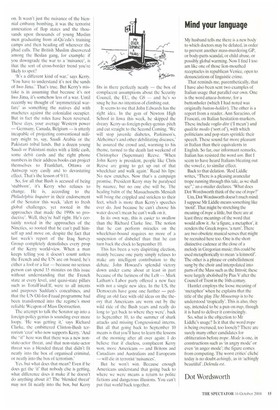Mind your language
My husband tells me there is a new body to which doctors may be delated, in order to prevent another mass-murdering OP, or body-parts scandal, or child abuse, or possibly global warming. Now I find I too am like one of those lion-mouthed receptacles in republican Venice, open to denunciations of linguistic crime.
That reminds me, parenthetically, that I have also been sent two examples of Italian usage that parallel our own. One is the word attaca-bottone, for a buttonholer (which I had noted was originally button-holder). The other is a report from a reader, Ann Saracino, of Frascati, on Italian hesitation-markers. These include voglio dire CI mean') and qualche modo ('sort of'), with which politicians and pop stars sprinkle their speech. These sound far more pleasant in Italian than their equivalents in English. So far, our informant remarks, Italian has resisted the word urn. But I seem to have heard Italians bleating out the vowel e, to similar effect.
Back to that delation. 'Rod Liddle writes, "There is a pleasing avuncular trope running through this tale, as we shall see",' an e-mailer declares. 'What does Dot Wordsworth think of the use of trope?'
Um, Dot Wordsworth doesn't much mind. I suppose Mr Liddle means something like 'motif. That might be stretching the meaning of trope a little, but there are at least three meanings of the word that would allow it. As 'a figure, a metaphor', it renders the Greek tropo.s, 'a turn'. There are two obsolete musical senses that might be recruited here too. One is the short distinctive cadence at the close of a melody in Gregorian music; this could be used metaphorically to mean 'a leitmotif. The other is a phrase or embellishment sung by the choir and interpolated into parts of the Mass such as the Introit; these were largely abolished by Pius V after the Council of Trent in the 16th century.
Hamlet employs the loose meaning of 'metaphor' when he explains that the title of the play The Mousetrap is to be understood 'tropically'. This is also, they say, intended to be a pun on trap, though it is hard to deliver it convincingly.
So, what is the objection to Mr Liddle's usage? Is it that the word trope is being overused, too loosely? There are surely many other candidates for obliteration before trope. Mode is one, in constructions such as 'in angry mode' or even 'in anger mode'; the figure comes from computing. The worst critics' cliché today is no doubt achingly, as in 'achingly beautiful'. Delentla est.
Dot Wordsworth










































































































 Previous page
Previous page